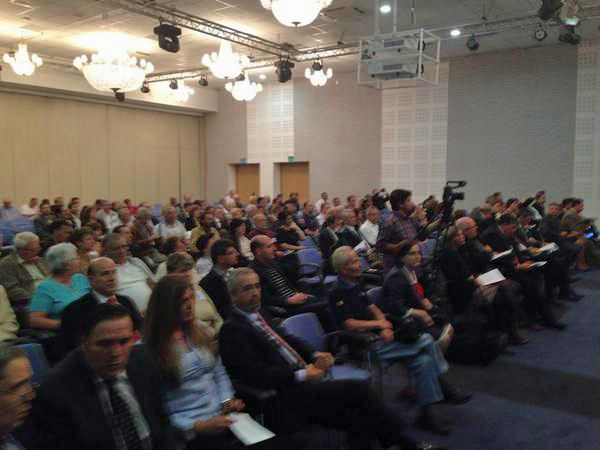'Military intervention will not solve underlying issues'
'Military intervention will not solve underlying issues'
Invest in education and the alleviation of poverty, say Middle East Baptist leaders.
 That was the message from Baptists leaders in the Middle East during the recent gathering of the European Baptist Federation (EBF) Council. The EBF represents Baptist churches and Unions both in Europe and the Middle East.
That was the message from Baptists leaders in the Middle East during the recent gathering of the European Baptist Federation (EBF) Council. The EBF represents Baptist churches and Unions both in Europe and the Middle East.
Seven leaders from the Middle East were present at last week’s EBF meeting in Bucharest, where one whole session was devoted to listening to them describe the challenges – and in some cases – the suffering of their situations.
‘What came across was their consistent faith and trust in God for the continuing life of the churches, even in extreme situations,’ reported EBF General Secretary Tony Peck.
‘One clear statement which came out of that was that they all felt that airstrikes and military intervention will do little in the longer term to solve the underlying issues which have led to the rise of the Islamic State, and could make them worse.
‘They urged the EBF and indeed Western Governments to invest in education and the alleviation of poverty as the priorities for rebuilding life and trying to establish peace in the Middle East.’
These hopes were expressed in an EBF resolution on the Middle East, which among a number of points, expressed solidarity with Christians and other religious minorities suffering because of multiple conflicts and aggressive persecution, and stated that “the path to achieve peace and to be free of extremism is through Justice, Development, Human Rights and Rule of Law.”
This was one of three resolutions made at the Council, which had a general theme of peace and reconciliation.
Russia and Ukraine was the focus of another resolution, which was initially made by the Baptist World Alliance in July and adopted by the EBF. One of the Union Vice-Presidents, Igor Bandura described the very difficult situation which exists in eastern Ukraine.
Baptists and other evangelicals have been especially targeted by the Russian-backed rebels because they are seen as Western agents.
Among its points this resolution urged the leaders and churches of the Baptist unions of Ukraine and Russia “to overcome prejudice and misunderstanding in the situation, to seek to “speak the truth in love” (Ephesians 4:15) to each other, and to continue to work together in partnership toward a common vision of mission and the growth of the Kingdom of God in their region.”
The final resolution focused on the centenary of World War 1. The Council paused at noon on Friday for an act of reflection on this centenary, led by Mr Peck along with Christoph Stiba, the General Secretary of the Baptist Union of Germany.
Mr Peck said, ‘Our Resolutions reflected all three of these parts of our Council, on the Middle East, on Ukraine, and remembering the First World War. We certainly want our member Unions to use these among their churches, and also when speaking to their own governments about these situations.’
'Our Middle East Representative, Nabil Costa (Lebanon) will continue to update us as to what practical steps we can take to help situations like that of the Syrian and Iraqi refugees, and in Gaza.'
The EBF adopted some strategic priorities for the next five years: chief among these is the putting together of a programme for Younger/Emerging leaders in the EBF to equip them for leadership in the member Union and indeed in the EBF itself.
The Council also heard for the first time from Stuart Blythe, the new Rector of the International Baptist Theological Study Centre (IBTSC) in Amsterdam.
Mr Peck said, 'This has got off to an excellent start with new staff and students based in the Baptist House shared with the Baptist Union of the Netherlands, its Seminary and the EBF. We look to the future with confidence!'
View the EBF resolutions at: http://www.ebf.org/council-resolutions
This story first appeared on The Baptist Times and is used with permission.
Photo: EBF Council Opening Service, Nabil Costa